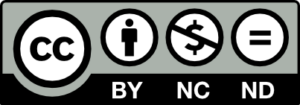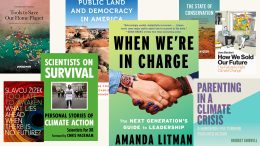“A patriot…wants the nation to live up to its ideals, which means asking us to be our best selves. A patriot must be concerned with the real world, which is the only place where their country can be loved and sustained. The patriot has universal values, standards by which they judge their nation, always wishing it well — and wishing that it would do better.”
— Timothy Snyder, On Tyranny
It’s the summer season: Barbeques are firing up, the stars and stripes are in view, and people are preparing to make a difference in the second half of the year.
As we look to the “patriotic threesome” of holidays celebrated across the United States — Memorial Day, the Fourth of July, and Labor Day — it’s a good time to ask how you’ll show your patriotism for the planet. It’s especially important this year, given the current wave of misappropriation and compromises facing our natural lands and resources.
Eight new environmental books might offer you some ideas on how to accomplish that. They offer ideas for getting involved in politics, improving your activism, and making important changes in your homes and communities.
We’ve excerpted the books’ official descriptions below and provided links to the publishers’ sites, but you should also be able to find these books in a variety of formats through your local bookstore or library.
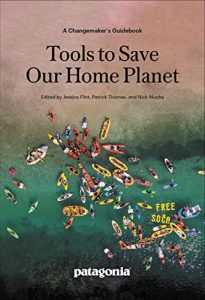
Tools to Save Our Home Planet: A Changemaker’s Guidebook
edited by Nick Mucha, Jessica Flint, and Patrick Thomas
The need for activism is more urgent than ever before and the risks are greater, too. Safe and effective activism has always required smart strategic planning, clear goals and creative tactics, and careful and detailed preparation. Without these, activists can end up injured, penalized, or jailed. If anything, these risks are greater today as powerful forces in government and industry resist the big changes needed to slow the climate crisis and keep Earth livable for generations to come.
Tools to Save Our Home Planet: A Changemaker’s Guidebook reflects the wisdom and best advice from activists working in today’s volatile world. A go-to resource for driving change, it offers timely and relevant insights for purpose-aligned work. It is intended as a primer for those new to activism and a refresher for seasoned activists wanting to learn from their peers, a reassuring and inspirational companion to the environmental and justice movements that we desperately need as a society.
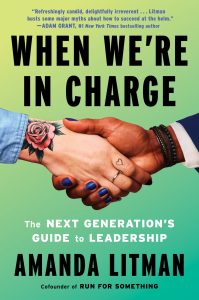
When We’re in Charge: The Next Generation’s Guide to Leadership
by Amanda Litman
Most leadership books treat millennials and Gen Z like nuisances, focusing on older leadership constructs. Not this one. When We’re in Charge is a no-bullshit guide for the next generation of leaders on how to show up differently, break the cycle of the existing workplace. This book is a vital resource for new leaders trying to figure out how to get stuff done without drama. Offering solutions for today’s challenges, Litman offers arguments for the four-day workweek, why transparency is a powerful tool, and why it matters for you to both provide and take family leave. A necessary read for all who occupy or aspire to leadership roles, this book is a vision for a future where leaders at work are compassionate, genuine, and effective.
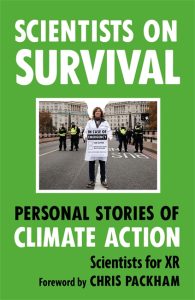
Scientists on Survival: Personal Stories of Climate Action
by Scientists for XR
In this important and timely book, scientists from a broad range of disciplines detail their personal responses to climate change and the ecological crises that led them to form Scientists for XR [Extinction Rebellion] and work tirelessly within it. Whether their inspiration comes from education or activism, family ties or the work environment, the scientists writing here record what drives them, what non-violent direct action looks like to them, what led them to become interested in the environmental crisis that threatens us all, and what they see as the future of life on Earth.

by Julie Brugger
Public Land and Democracy in America brings into focus the perspectives of a variety of groups affected by conflict over the monument, including residents of adjacent communities, ranchers, federal land management agency employees, and environmentalists. In the process of following management disputes at the monument over the years, Brugger considers how conceptions of democracy have shaped and been shaped by the regional landscape and by these disputes.
Through this ethnographic evidence, Brugger proposes a concept of democracy that encompasses disparate meanings and experiences, embraces conflict, and suggests a crucial role for public lands in transforming antagonism into agonism.
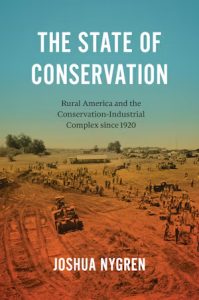
The State of Conservation: Rural America and the Conservation-Industrial Complex since 1920
by Joshua Nygren
In the twentieth century, natural resource conservation emerged as a vital force in U.S. politics, laying the groundwork for present-day sustainability. Merging environmental, agricultural, and political history, Nygren examines the political economy and ecology of agricultural conservation through the lens of the “conservation-industrial complex.” This evolving public-private network — which united the U.S. Department of Agriculture, Congress, local and national organizations, and the agricultural industry — guided soil and water conservation in rural America for much of the century. Contrary to the classic tales of U.S. environmental politics and the rise and fall of the New Deal Order, this book emphasizes continuity. Nygren demonstrates how the conservation policies, programs, and partnerships of the 1930s and 1940s persisted through the age of environmentalism, and how their defining traits anticipated those typically associated with late twentieth-century political culture.

Too Late to Awaken: What Lies Ahead When There Is No Future
by Slavoj Žižek
We hear all the time that we’re moments from doomsday. Around us, crises interlock and escalate, threatening our collective survival: Russia’s invasion of Ukraine, with its rising risk of nuclear warfare, is taking place against a backdrop of global warming, ecological breakdown, and widespread social and economic unrest. Protestors and politicians repeatedly call for action, but still we continue to drift towards disaster. We need to do something. But what if the only way for us to prevent catastrophe is to assume that it has already happened — to accept that we’re already five minutes past zero hour?
Too Late to Awaken sees Slavoj Žižek forge a vital new space for a radical emancipatory politics that could avert our course to self-destruction. He illuminates why the liberal Left has so far failed to offer this alternative, and exposes the insidious propagandism of the fascist Right, which has appropriated and manipulated once-progressive ideas. Pithy, urgent, gutting and witty Žižek’s diagnosis reveals our current geopolitical nightmare in a startling new light, and shows how, in order to change our future, we must first focus on changing the past.
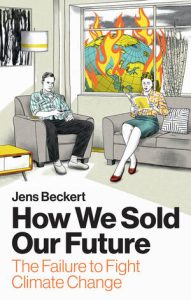
How We Sold Our Future: The Failure to Fight Climate Change
by Jens Beckert
For decades we have known about the dangers of global warming. Nevertheless, greenhouse gas emissions continue to increase. How can we explain our failure to take the necessary measures to stop climate change? Why are we so reluctant to act?
Beckert provides an answer to these questions. Our apparent inability to implement basic measures to combat climate change is due to the nature of power and incentive structures affecting companies, politicians, voters, and consumers. Drawing on social science research, he argues that climate change is an inevitable product of the structures of capitalist modernity which have been developing for the past 500 years. Our institutional and cultural arrangements are operating at the cost of destroying the natural environment and attempts to address global warming are almost inevitably bound to fail. Temperatures will continue to rise, and social and political conflicts will intensify. We are selling our future for the next quarterly figures, the upcoming election results, and today’s pleasure. Any realistic climate policy needs to focus on preparing societies for the consequences of escalating climate change and aim at strengthening social resilience to cope with the increasingly unstable natural world.
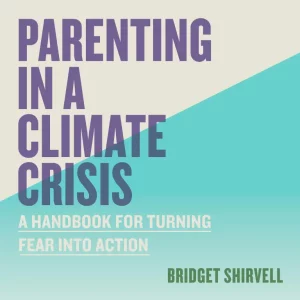
Parenting in a Climate Crisis: A Handbook for Turning Fear into Action
by Bridget Shirvell
In this urgent parenting guide, learn how to navigate the uncertainty of the climate crisis and keep your kids informed, accountable, and hopeful — with simple actions you can take as a family to help the earth.
Kids today are experiencing the climate crisis firsthand. Camp canceled because of wildfire smoke. Favorite beaches closed due to erosion. Recess held indoors due to extreme heat. How do parents help their children make sense of it all? And how can we keep our kids (and ourselves) from despair?
Environmental journalist and parent Bridget Shirvell has created a handbook for parents to help them navigate these questions and more, weaving together expert advice from climate scientists, environmental activists, child psychologists, and parents across the country. She helps parents answer tough questions (how did we get here?) and raise kids who feel connected to and responsible for the natural world, feel motivated to make ecologically sound choices, and feel empowered to meet the challenges of the climate crisis—and to ultimately fight for change.
Enjoy these summer reads throughout the holidays and get involved with activities and protests that support our environment and wildlife. Whether it’s changing the way you celebrate to more sustainable fun or joining environmental summer pursuits, we hope you’ll make good trouble this holiday season.
For hundreds of additional environmental books — including several on staying calm in challenging times — visit the Revelator Reads archives.
